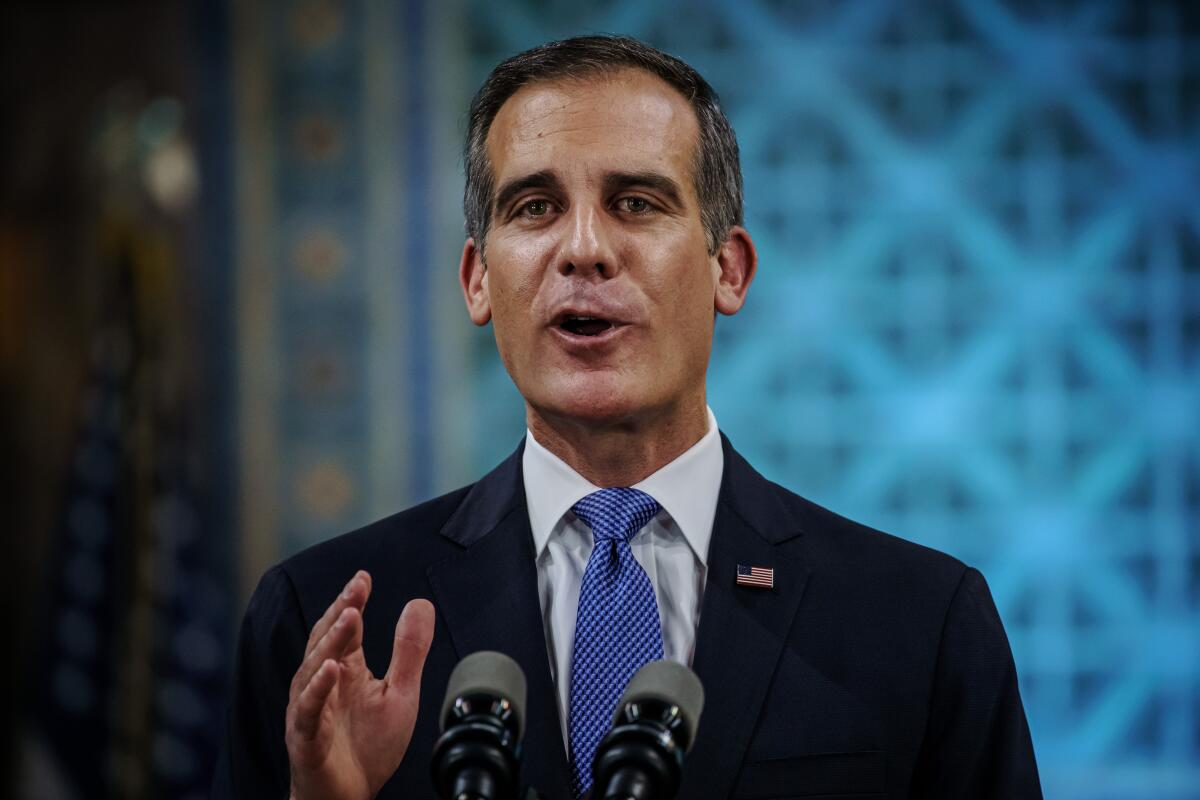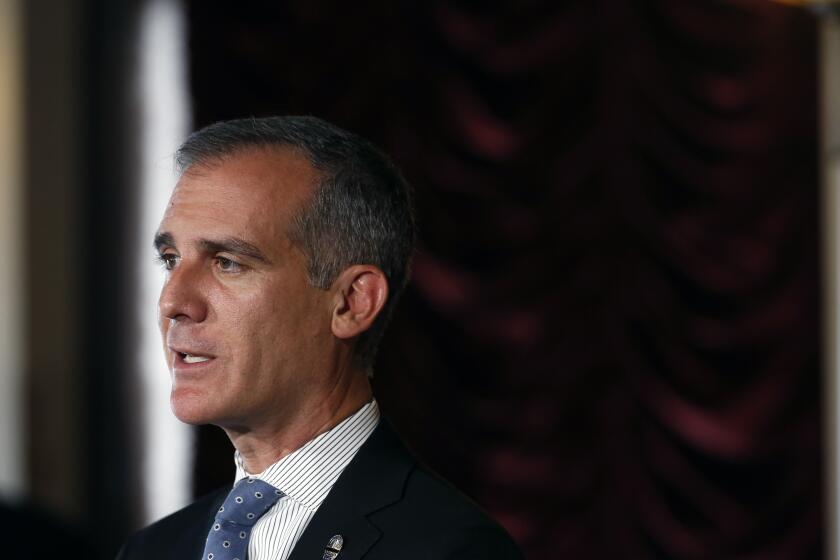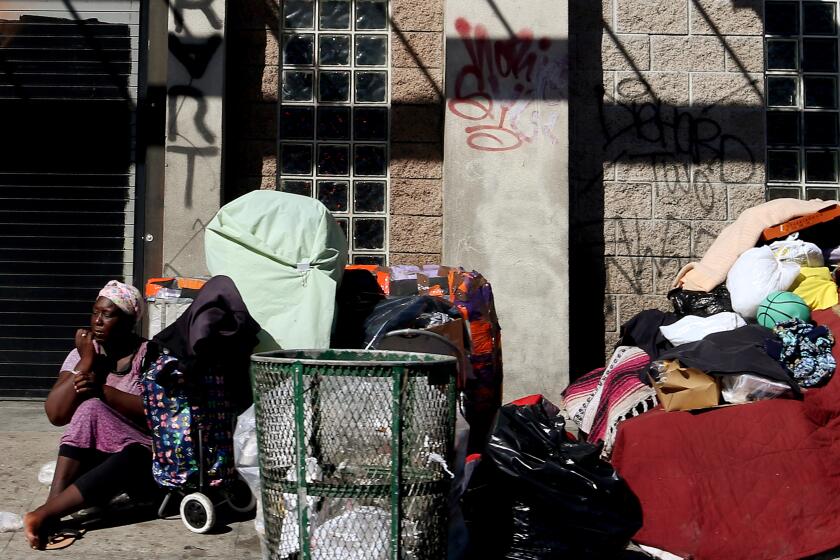L.A.’s budget crisis worsens as deficit projections climb to $600 million

The pandemic-driven financial crisis at Los Angeles City Hall has deepened significantly over the past three months, with budget analysts warning the city’s shortfall could reach $400 million to $600 million by the end of the fiscal year.
The grim forecast poses some tough choices for city leaders, with a local economy battered by coronavirus shutdowns that have sent unemployment soaring, caused many small businesses to close and now threaten major cuts in municipal services.
In an update sent Friday to Mayor Eric Garcetti and various council members, City Administrative Officer Rich Llewellyn voiced alarm over the magnitude of the latest projected revenue shortfall, which covers the fiscal year ending June 30.
A $400-million budget gap would represent 6% of the 2020-21 budget and exhaust all but $14 million of the city’s various reserve funds, wrote Llewellyn, the city’s top budget official.
“A $600-million revenue shortfall equates to 9% of the 2020-21 budget, well above any available reserves and any currently identifiable solutions,” he wrote.
Llewellyn had previously forecast a shortfall ranging from $200 million to $400 million, according to the report. With taxes, fees and fines still coming in below projections, and some of the city’s cost-cutting measures delayed by several months, the city will need to reduce spending aggressively, relying on “all available fiscal restraint tools,” the report said.
L.A. mayor and several city unions struck a deal to delay the city’s furloughs. Workers now will face just one unpaid day off before the end of the year.
Garcetti has already instructed city department heads to prepare for a “potential layoff scenario,” compiling lists of positions that could be eliminated. On Friday, an aide to the mayor said that unless the federal government steps in with assistance, the COVID-19 outbreak will force the city to pursue “catastrophic service cuts.”
“The mayor is addressing this shortfall with a variety of cost-saving measures, and has directed departments to prepare for layoffs,” said Garcetti spokesman Alex Comisar. “But this report shows that we, along with cities and states across the country, need Washington to step up, and we need that help now.”
Garcetti first proposed that the city address its budget crisis, at least in part, by imposing furloughs — effectively a 10% pay cut — forcing civilian city employees to take one unpaid day off every 10 days.
That move was expected to cut costs by up to $139 million. But Garcetti and the council changed course after conferring with the city’s unions, who recommended that the city pursue a buyout program instead, offering workers eligible for retirement up to $80,000 to leave.
The buyout initiative was expected to save as much as $58.7 million if every eligible worker took part. But the response was weaker than hoped for and on Friday, Llewellyn said the program is on track to save just $2.6 million this year.
Council members also voted in July to cut the Los Angeles Police Department Budget by $150 million, saying at least a portion of the money would likely be used to delay employee furloughs. They also reached a deal to have civilian city workers take two unpaid days off in November and April, in exchange for a new floating holiday.
Those workers could still see 11 furlough days during the first half of 2021, according to the report.
While Garcetti and Llewellyn drew a link between the financial crisis and the COVID-19 outbreak, city leaders are also facing rising costs, with employees receiving a series of raises, bonuses and other benefit increases.
Police officers are slated to receive a combined 4.8% increase over the current fiscal year, as well as new bonuses for those who have college degrees. The increased costs from their contract were expected to add $123 million to the city’s budget this year.
Bill Przylucki, who heads the activist group Ground Game L.A., said the city should move quickly to have civilian workers take on more of the assignments currently being handled by police officers, including traffic enforcement, noise complaints and nonviolent mental health calls.
Several L.A. City Council members support a push for a new law forbidding homeless people from setting up camps near the city’s new bridge shelters.
That shift would reduce the city’s salary costs, he said. If layoffs are needed, the LAPD — which is projected to consume roughly $3 billion this year — will need to do its part, Przylucki added.
“The most bloated part of the budget is the police budget, without question,” he said. “That would be, in my opinion, the first place to look if cuts are going to have to be made.”
Dustin DeRollo, spokesman for the Los Angeles Police Protective League, the LAPD’s largest union, said city leaders should look elsewhere if reductions are needed. The council already cut 250 officers from the department’s budget earlier this year, he said.
“With murders up 26% and shootings up 23%, and no sign of slowing, more cuts to police resources make zero sense and put Angelenos at risk,” he said. “We’ve already made sacrifices to support city budget shortfalls.”
The city’s firefighter union received a 4.75% pay increase on July 5 and is poised to receive another 3% next summer. And the Coalition of L.A. City Unions, which represents a half-dozen non-sworn employee groups, is slated to receive a 2% raise in January and another 2% in June.
Councilman Paul Krekorian, who heads the council’s budget committee, said he’s still hoping the federal government will provide financial relief to cities and states battered by coronavirus. If that funding does not arrive, furloughs and more drastic cuts will be necessary, he said.
“Given the severity of the budget crisis we are facing, all options are on the table — including layoffs,” he said.
Bob Schoonover, president of Service Employees International Union Local 721, said in a statement that he plans to work with city leaders on cost-saving measures that protect “vital” services. But he also cautioned that “much is developing weekly” in terms of the COVID-19 crisis.
“It is still too soon in this fiscal year to make any drastic decisions,” he said.
More to Read
Sign up for Essential California
The most important California stories and recommendations in your inbox every morning.
You may occasionally receive promotional content from the Los Angeles Times.













